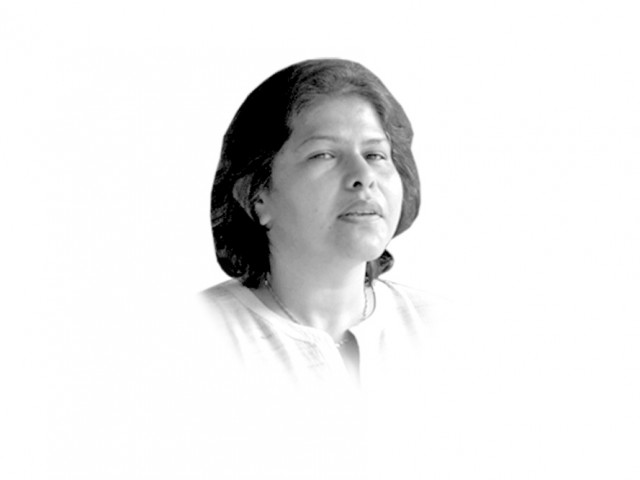Murder and the state’s responsibility
The misuse of the qisas and diyat laws will sadly produce more Shahrukh Jatois. It’s a tide that must be stemmed.

The writer is an independent social scientist and author of Military Inc.
Why condemn the poor father, who like many others, must have been forced into a compromise? Why not condemn and examine a legal system that allows for such compromises. I am indeed pointing a finger at Pakistan’s legal system that has allowed the state to voluntarily surrender its responsibility to protect its citizens — all in the name of Allah. The larger albatross around the state’s neck are the qisas and diyat laws, which were invoked in the Sarfraz Shah case, the case of the young man killed by the Rangers, or many others who can’t afford justice in this country. Our legal history is replete with cases in which numerous judges showed their magnanimity by ordering the payment of blood-money in addition to exchange of women. This particular law is one of the reasons that there is a low conviction rate in Pakistan because a large number of cases are settled even before a judgment is given invoking qisas and diyat. According to data given in Tahir Wasti’s seminal work, Application of Islamic Criminal Law in Pakistan: Sharia in Practice (published in 2009), cancellation of murder cases increased from four per cent in 1981 to 11 per cent in 2000. Similarly, conviction at trial stage fell from 29 per cent in 1981 to 12 per cent in 2000 mainly because of the law that allows the state to voluntarily surrender its responsibility to try someone for committing the heinous crime of murdering a citizen in cold blood.
The issue of whether the relatives of the deceased of the state are responsible for punishing a murderer is open to interpretation. The Abbasids, who codified the Sharia law, left murder out of the ambit of state responsibility while making many other crimes that collectively had smaller effect on society. In fact, in 1977 when the framing of the law was being debated by Ziaul Haq, the then ministry of interior had argued using scholarly religious interpretation that there is nothing in the Holy Quran that forbids the state from striking back at the culprit (in case of murder). Qisas and diyat cannot be seen without acknowledging the particular historical context — the concept of ‘blood money’ (diyat) was introduced later to contain the continuation of a cycle of vengeance and bloodshed that was encouraged due to the principle of an ‘eye-for-an-eye’.
Sadly, the law in Pakistan’s case was a brainchild of Justices Afzal Cheema and Tanzeelur Rehman. Intriguingly, Ziaul Haq did not implement this law when he imposed his Nizam-e-Islam in February 1979 for the fear that Bhutto’s lawyers might use the law to their advantage as the entire body of the law does not allow for an approver. Indeed, Bhutto had filed a review petition number 5-R of 1979 on 13/02/1979 in the Supreme Court asking that his case be tried under Sharia or Nizam-e-Islam through first invoking the law on qisas and diyat.
The law was finally approved as an ordinance in 1990 by Ghulam Mustafa Jatoi’s caretaker government (encouraged by Ishaq Khan to please Justice Afzal Zullah), and finally made into a law in April 1997 under the second Sharif government. Legal history is replete with instances that indicate how the lower and higher judiciary and the larger legal community allowed the law to flourish. In any case, no one ventured to challenge the system. Human rights activist and Benazir Bhutto’s law minister in her first government, the late Iqbal Haider was quizzed about the legal community’s indifference to the law. His response on the floor of parliament was that this was due to their (the lawyers’) greed. A compromise allows lawyers to charge their clients without working hard for it.
The judges also tend to prefer diyat as it is easier than qisas, which was never implemented. As per the Sharia codified by the Abbasids, the condition of being a witness is almost unachievable unless logically amended. No wonder looking at the conditions for being a witness like: a) one who has never been punished for any crime, b) has always said all his prayers in time, c) never urinated standing up, d) never eaten from a marketplace, e) never committed any major sin, f) never committed any minor sin, and g) never failed to carry out obligations prescribed by the Holy Quran and sunnah. Pakistan’s former chief justice Sajjad Ali Shah commented that even he would not qualify as a witness. Thus, it was easier to use tazeer or diyat to pass judgments.
No sane society can survive without justice, peace and stability, and these cannot be ensured in an environment where people are allowed to get away with murder. The misuse of the qisas and diyat laws will sadly produce more Shahrukh Jatois. It’s a tide that must be stemmed.
Published in The Express Tribune, September 12th, 2013.
Like Opinion & Editorial on Facebook, follow @ETOpEd on Twitter to receive all updates on all our daily pieces.















COMMENTS
Comments are moderated and generally will be posted if they are on-topic and not abusive.
For more information, please see our Comments FAQ